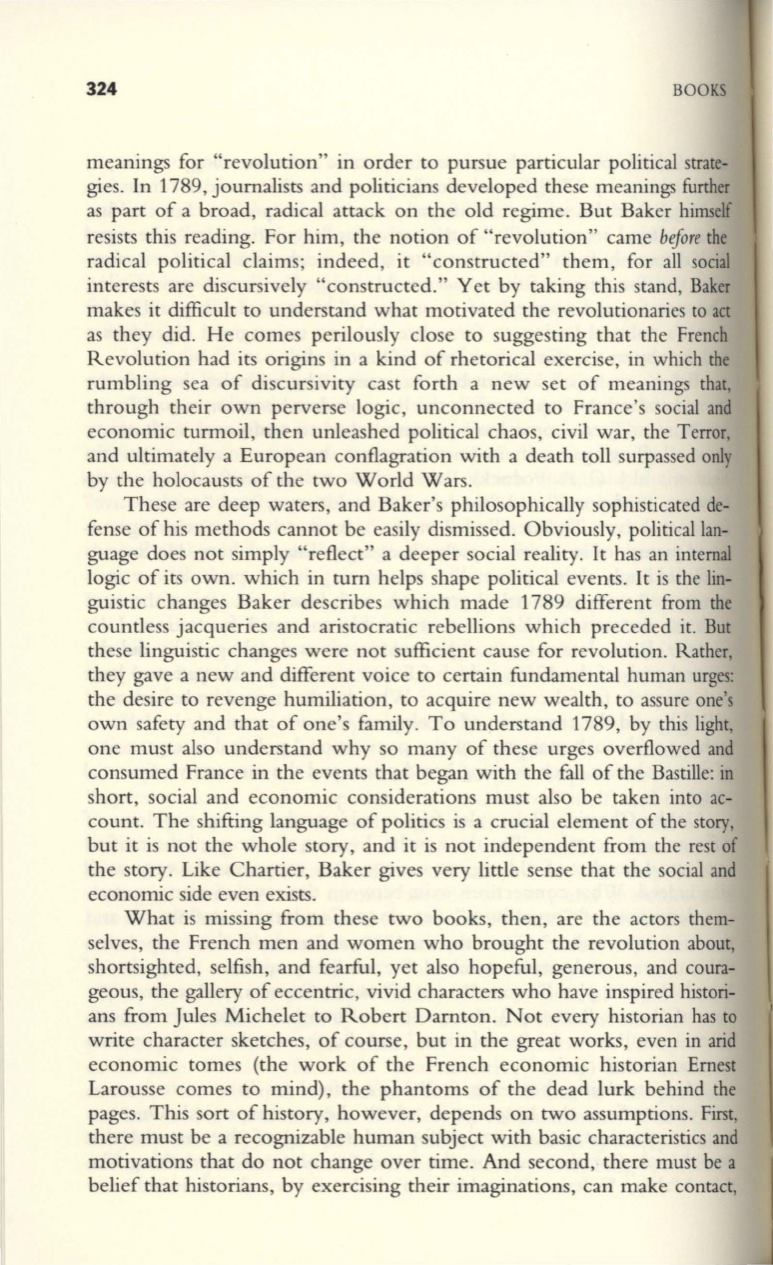
324
BOOKS
meanings for "revolution" in order to pursue particular political strate–
gies. In 1789, journalists and politicians developed these meanings further
as part of a broad, radical attack on the old regime. But Baker himself
resists this reading. For him, the notion of "revolution" came
bifore
the
radical political claims; indeed, it "constructed" them, for all social
interests are discursively "constructed." Yet by taking this stand, Baker
makes it difficult to understand what motivated the revolutionaries to act
as they did . He comes perilously close to suggesting that the French
Revolution had its origins in a kind of rhetorical exercise, in which the
rumbling sea of discursivity cast forth a new set of meanings that,
through their own perverse logic, unconnected to France's social and
economic turmoil, then unleashed political chaos, civil war, the Terror,
and ultimately a European conflagration with a death toll surpassed only
by the holocausts of the two Wodd Wars.
These are deep waters, and Baker's philosophically sophisticated de–
fense of his methods cannot be easily dismissed. Obviously, political lan–
guage does not simply "reflect" a deeper social reality. It has an internal
logic of its own. which in turn helps shape political events.
It
is the lin–
guistic changes Baker describes which made 1789 different from the
countless jacqueries and aristocratic rebellions which preceded it. But
these linguistic changes were not sufficient cause for revolution. Rather,
they gave a new and different voice to certain fundamental human urges:
the desire to revenge humiliation, to acquire new wealth, to assure one's
own safety and that of one's family. To understand 1789, by this light,
one must also understand why so many of these urges overflowed and
consumed France in the events that began with the fall of the Bastille: in
short, social and economic considerations must also be taken into ac–
count. The shifting language of politics is a crucial element of the story,
but it is not the whole story, and it is not independent from the rest of
the story. Like Chartier, Baker gives very little sense that the social and
economic side even exists.
What is missing from these two books, then, are the actors them–
selves, the French men and women who brought the revolution about,
shortsighted, selfish, and fearful, yet also hopeful, generous, and coura–
geous, the gallery of eccentric, vivid characters who have inspired histori–
ans from Jules Michelet to Robert Darnton. Not every historian has to
write character sketches, of course, but in the great works, even in arid
economic tomes (the work of the French economic historian Ernest
Larousse comes to mind), the phantoms of the dead lurk behind the
pages. This sort of history, however, depends on two assumptions. First,
there must be a recognizable human subject with basic characteristics and
motivations that do not change over time. And second, there must be a
belief that historians, by exercising their imaginations, can make contact,


